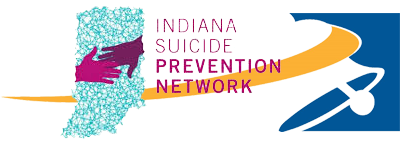Training
The trainings listed below are appropriate for community members and people in work settings. The cost and trainer availability for the trainings vary.
The Indiana Division of Mental Health & Addiction (DMHA) is currently offering free or low cost training through it’s Garrett Lee Smith Youth Suicide Prevention grant program (through 2026). See asterisks below for available trainings.
Basic Suicide Prevention Training
These trainings focus on teaching basic skills to adults or youth about how to recognize and respond to suicide risk.
-
Question, Persuade, and Refer (QPR)*
A 2-hour virtual or in-person training (for adults and youth ages 15+) that teaches the three simple steps anyone can learn to help save a life from suicide. QPR teaches how to recognize the warning signs of suicide and how to question, persuade, and refer someone to help. The Indiana Department of Education currently offers QPR for free for schools. Contact: Jason Craig. QPR Institute also offers on-line training for subpopulations such as healthcare providers, mental health providers, schools, coaches, elder care workers and those who work with veterans. Learn more
*QPR Trainer Certification Course (training for trainers or T4T): An 8-hour training to learn how to deliver the QPR program. Learn more -
safeTALK
A 3 ½ hour in-person training for people (for adult and youth ages 15+) and older that provides in-depth skills to recognize signs of suicide, engage someone, and ensure a connection to safety. Learn more -
S.A.V.E. Training
A free 1 hour in-person or virtual training provided by the VA to learn skills to help a veteran who is in crisis or experiencing suicidal thoughts with with care and compassion. For more information contact Scott Ralya. -
Columbia – Suicide Severity Rating Scale (C-SSRS)
A 1-1 ½ hour training (for adults) to learn how to use a 6-item screener to determine if someone is at low, medium, or high risk for suicide. The screener can be used in a wide range of settings and for individuals of all ages. The IDOE and Columbia University offer recorded trainings. For live trainings, see our Resources page for trainers. Learn more -
Counseling on Access to Lethal Means (CALM)
A 1 to 2-hour training (for adults) (offered free on-line or in-person) that teaches people how to reduce access to the methods people use to kill themselves. It covers how to identify people who could benefit from lethal means counseling, ask about their access to lethal means, and work with them and their families to create suicide safety by reducing access to lethal means. Learn more -
LivingWorks Start
A 90-minute interactive on-line program (for adults and youth ages 13+) teaches how to recognize when someone is thinking about suicide and connect them to help and support. Access it -
At-Risk for Educators
An interactive role-play simulation (adults) that builds awareness, knowledge, and skills about mental health and suicide prevention, and prepares users to lead real-life conversations with students that build resilience, strengthen relationships, and connect them with support. Learn more -
Jason Foundation Professional Development Series
A series of online staff development modules for adults who work with youth that provide information on the awareness and prevention of youth suicide. Learn more
Youth Programming & Curriculum
-
Lifelines®
A Comprehensive Suicide Awareness and Responsiveness Program for Teens is a whole-school program made up of three components: Lifelines: Prevention (classroom curriculum), Lifelines: Intervention (for counselors/administrators), and Lifelines: Postvention (after a suicide procedures). Instruction on developing comprehensive policy & procedures is provided. Learn more -
Sources of Strength
A peer led, strength-based, comprehensive wellness program that focuses on suicide prevention by promoting connection to trusted adults, help-seeking, and sharing stories of strength to build resilience. Learn more -
Hope Squad
A peer-led group who are trained to take action when someone is struggling. They learn to show empathy to their peers, listen without judgment, and reduce stigma regarding help-seeking and mental illness. Learn more -
Yellow Ribbon Suicide Prevention Program®
1 hr presentations for students to build awareness and education including cards that help students ask for help or be a link to others). Learn more -
Talk Saves Lives
A 45-60 minutes presentation offered by American Foundation for Suicide Prevention volunteers that covers the general scope of suicide, the research on prevention, and what people can do to fight suicide. Learn more -
Bring Change to Mind (BC2M) High School Program
A peer-led mental health club that empowers teens to educate one another, and their communities, and to create a culture of peer support within their schools to fight mental health stigma. Learn More
Advanced Suicide Training
Additional in-depth training for specific caregivers and persons affected by suicide
-
Applied Suicide Intervention Skills Training (ASIST)
A 2-day in-person interactive workshop for anyone (adults and youth ages 16+) to learn how to prevent suicide by recognizing signs, providing a skilled, person-centered intervention, and developing a safety plan to keep someone alive. Learn more -
*Collaborative Assessment and Management of Suicidality (CAMS)
An on-line and live training to learn to use an evidence-based therapeutic framework for suicide-specific assessment and treatment of a client’s suicidal risk (for clinicians and counseling students). The course includes a 3-hour online self-paced video, a 7-hour online role play training day, and four consultations calls. Learn more -
Assessing and Managing Suicide Risk (AMSR)
A 1-day in-person training that uses best practices recommended by the nation’s leading experts to train clinicians and other healthcare professionals how to determine the level of suicide risk for an individual. Learn more -
*Shield of Care (Juvenile Justice Professionals)
A suicide prevention curriculum designed specifically for staff that work in juvenile justice facilities to lear how to play an active role in intervening to protect youth from suicide and support youth in building resiliency. Learn more -
*Alternatives to Suicide
An in-person training to either learn to become a Facilitator for Alternative to Suicide Support Groups (Facilitator Training, 3 days) or to advocate for systems change (Dialogue & Systems Change Training, 2 days). The Alternatives to Suicide approach is about providing space (support group or as a peer support worker) to openly explore the meaning behind thoughts and feelings of suicide, as well as what might be worth living for. “Alt2Su” honors collective wisdom and individuals’ lived experiences to promote authentic connection and healing, whether in a peer support setting or anywhere else these conversations come up. Learn more | Find an Alt2Su Group
System-wide Training
-
*Zero Suicide Academy
An in-person training that provides expert support to systems of health and mental healthcare committed to adopting and sustaining continuous quality improvement practices designed to transform suicide prevention and treatment. A 9 month Community of Practice is provided to organizations that have taken this training to support implementation. Learn more Contact: education@mhai.net
Mental Health-focused Training
-
Mental Health First Aid
An 8-hour skills-based training course (in-person and/or on-line) that teaches participants how to identify someone facing a mental health challenge and how to use a five-step action plan to help someone who is experiencing a mental health crisis. Training has on-line and in-person implementation. There are Adult Mental Health First Aid, Youth Mental Health First Aid (adults serving youth) and Teen Mental Health First Aid (for youth) trainings. Learn more
Suicide Postvention/Treatment
These trainings focus helping communities and individual help those who have had a suicide loss heal.
-
*AFSP Suicide Loss Support Group Facilitator Training
A 2-day training to learn how to create and facilitate a community support group for suicide loss survivors in the aftermath of a suicide. Training includes lecture, interactive discussion, and role-playing. They are led by experts in the field of suicide bereavement. AFSP offers two courses: one on facilitating adult support groups, and another on facilitating child and teen support groups. Learn more. Contact: Kelsey Aaron -
*Local Outreach to Suicide Survivors (LOSS) Teams Training
A 2-day in-person training to build and coordinate a Local Outreach to Suicide Survivors (LOSS) Team. LOSS Teams are made up of trained suicide loss survivors and other volunteers that provide practical support, connection to resources, and instillation of hope to suicide loss survivors immediately after receiving the news of their loved one’s suicide. A community of practice is also being developed to mentor new teams. Learn more | Connect to a LOSS Team in your area -
*AFSP Suicide Bereavement Clinician Training
A 1-day training (on-line or in-person) for clinical professionals seeking to bolster their knowledge and understanding of the psychological impact of suicide and grief therapy techniques specific for survivors of suicide loss. Suicide bereavement trained clinicians are informed of research with survivors and principles of long term clinical work with survivors of suicide. Learn more

